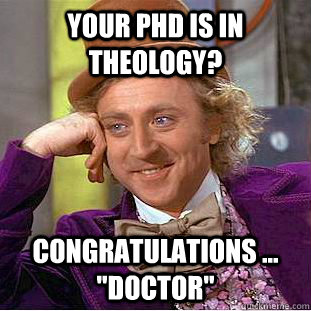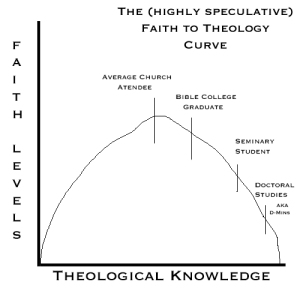My time with Theology, while brief, has been filled with all the ups and downs you’d expect during the course of a relationship. There was that, “love at first sight,” moment in the bookstore that caused me to passionately pursue her. After spending a large amount of time together, I developed a dependency that threatened to ruin all my other relationships. I didn’t know how needy Theology was though, and I started to burn out, and we nearly lost everything we had, as a result. The reconciliation process was slow and, a while later, we decided we should be “just friends.”
Ridiculous metaphors aside, I think it’s safe to say that anyone who has engaged in theology, and called it a passion, has struggled with its placement in their life. Most understand that theology is about discovering who God is, not a discovery in it of itself. But if you polled men and women in Bible College and Seminary they would probably tell you their study of the Bible and historical church is, in fact, their primary means of relating with Him. What this leads to, inevitably, are young men and women who become theological theorists; proclaiming ideas of both conservative and liberal persuasions with feeble applications and only a limited capacity to understand why those ideas even matter.
Taking note of this, the average church goer sees the word “theology” and immediately attaches a negative connotation to it. They fear that if you “know” too much, you’ll ultimately lose sight of the Gospel’s simplicity. This happened recently when I expressed to a friend, who has known me for over twenty years, that I wanted to attend Seminary. He made sure to remind me not to get “big headed,” while pursuing those studies. Unfortunately, he’s about the 87th person to tell me that.
While I’m sure 99.9% of professing Christians would say (some begrudgingly) that theology is a good thing, they would also say that “too much of a good thing is bad.”
I’m not so convinced that there is an accurate knowledge/faith ratio curve whereby there is some sort of “balance” to reach. If there was, I imagine it would look something like this.
Rather than trying to guesstimate how much knowledge is too much, it may be better to ask what the task of theology is. If theology is the “study of God, and religious belief” then it can rightfully be said that its purpose is to re-discover what it is God has already said and shown of Himself.
That’s it.
Theology seeks to understand, and to be understood by, the One who it courts. Fortunately, one of those has already been done for us.

